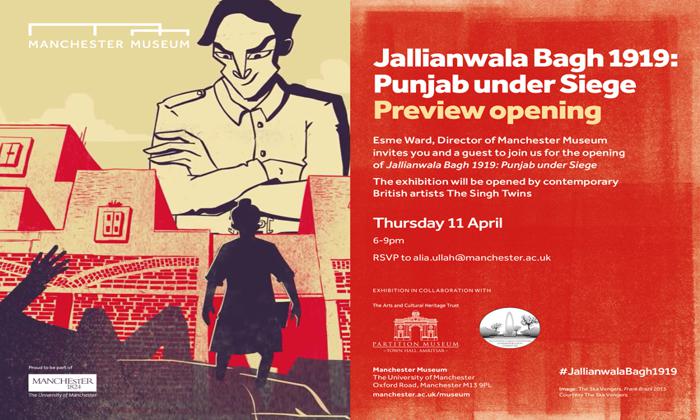Manchester Museum commemorates 100 years since Jallianwala Bagh Massacre
05 Apr 2019
For the first time in Indo-UK history, two Museums located in cities deeply affected by colonialism, Amritsar and Manchester, have come together to re-examine the brutal massacre that eventually brought about the end of the British empire

This is a collaboration between Manchester Museum, part of The University of Manchester and the Partition Museum (set up by The Arts and Cultural Heritage Trust), Amritsar, India. The co-curated exhibition ‘Jallianwala Bagh 1919: Punjab under Siege’ coincides with the centenary of the Jallianwala Bagh massacre in April 2019, and the bicentenary commemorations for the Peterloo massacre.
Revisiting the event, its causes and aftermath, the nuanced exhibition explores what we remember, how we remember it, and what we have forgotten, in India and the UK. Jallianwala Bagh 1919: Punjab under Siege explores the causes for the unrest in the Punjab before, during and after the events which took place on 13 April 1919, when British troops opened fire on peaceful Indian protestors.
Protestors had gathered to challenge British rule before they were set upon by Colonel Reginald Dyer and his troops. Confined within an enclosed barren ground called Jallianwala Bagh in the Indian city of Amritsar, hundreds of Indians were killed and thousands injured. This was a defining moment in the fight for Indian independence and led to the eventual demise of the British Empire in South Asia. The exhibition will raise awareness of the peaceful protest and direct action, martial law, the divergent British and Indian inquiry findings, and the ongoing social, political, and cultural response.
Alongside the citywide Peterloo commemorations, Manchester Museum will take the lead on addressing the need for a Global South perspective on the use of violence by British forces against peaceful protestors and its legacy. Kishwar Desai’s book - Jallianwala Bagh, The Real Story - formed the basis of the exhibition; "There is no doubt that history belongs primarily to the victor, but only as long as we allow it. The truth cannot remain hidden for all time.”
Join Manchester Museum for the preview opening of ‘Jallianwala Bagh 1919: Punjab under Siege’ on 11 April, 6-9pm.
- The exhibition will be formally opened by Lord Desai on behalf of the Partition Museum, Amritsar India. Lord Desai is a member of the Jallianwala Bagh Centenary Commemoration Committee, set up to mark 100 years since the tragic event. He has actively campaigned to commemorate the 100th anniversary of the Jallianwala Bagh massacre, initiating a debate in UK Parliament to discuss the British government’s plans to commemorate the centenary.
- New artwork titled 'Jallianwala:Repression and Retribution', by contemporary British artists, The Singh Twins will be unveiled by the artists themselves.
- Special performances from local Gudwara choir and Mancunian musician Aziz Ibrahim who has composed a commemorative musical piece.
